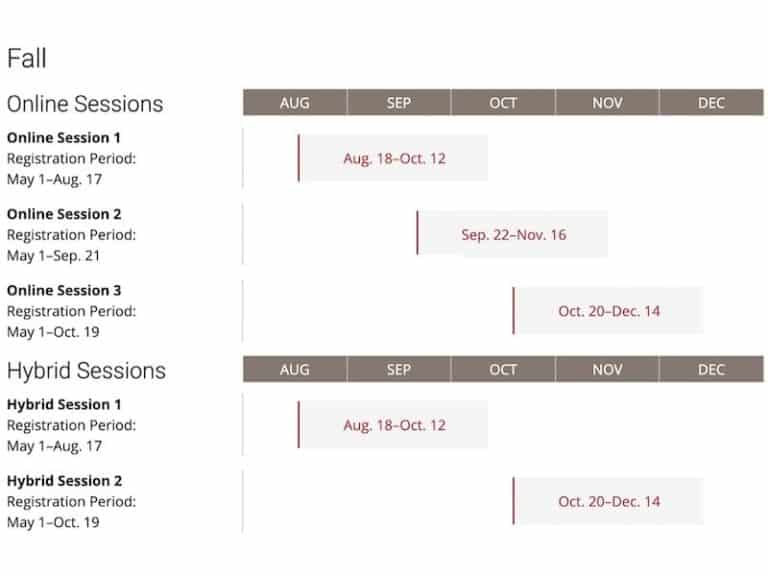What is a Bachelor’s Degree?
Enrolling in an undergraduate degree program that requires you to have a major (or two or even three) and an optional minor results in what’s referred to as a Bachelor’s Degree.
A Bachelor’s Degree is an undergraduate degree intended to provide a student with a thorough understanding of a field of study.
Although it’s also sometimes referred to as a four-year degree, a Bachelor’s Degree can be completed in as short as three years or as long as six years, depending on the number of credits enrolled per semester.
Different Types of Undergraduate Degrees
According to the US Department of Education, more than 80 Bachelor’s Degrees are conferred by American colleges and universities.
So, in other words, it’s almost hard to run out of a four-year degree to choose from!
Let’s take a quick look at some of the most common types of a Bachelor’s Degree:
Bachelor of Arts (BA)
One of the most popular Bachelor’s Degree types offered by many colleges and universities is a BA.
In most instances, a BA is an undergraduate degree program focusing on liberal arts education.
In other words, it demonstrates completion of subjects within the humanities and social sciences.
However, it’s not uncommon for some natural sciences to be included, too, such as biology, chemistry, physics and earth sciences like geology and oceanography, depending on the major and program.
Bachelor of Science (BS)
A BS is commonly pursued by undergraduate students who are looking to specialize or have a career in a field related to natural sciences, from mathematics, economics to physics and from nursing, computer science to engineering.
Needless to say, it’s the type of Bachelor’s Degree available for scientific and technical fields.
Many undergraduate degree programs with the most stringent requirements are the BS kinds.
Similarly, many BS degrees require students to complete a number of lab classes to be able to graduate and earn a degree.
Bachelor of Fine Arts (BFA)
It may not be one of the most commonplace among all types of undergraduate degrees alright, but a BFA is considered the most prestigious kind as far as the visual arts is the subject matter.
Undergraduates who are looking to gain foundational knowledge and transferable skills that allow them to have careers where creativity and artistry matter a lot may consider getting their hands on a BFA.
Some of the most common BFA majors include dance, photography, graphic design and creative writing.
Bachelor of Business Administration (BBA)
Just like what the undergraduate degree’s name suggests, a BBA prepares you for a career that has something to do with business, including starting your very own money-making enterprise.
A lot of those with a BBA go into management or establish their own businesses. However, it’s also quite normal for a BBA to be used in having a career in accounting, marketing, finance and even education and health care.
One of the most versatile Bachelor’s Degrees is a BBA, making it ideal for anyone who likes to try different careers.
How and Where Do You Obtain a Bachelor’s Degree
To obtain a Bachelor’s Degree, in most instances, you need to meet the minimum requirement of earning a total of 120 credits by taking general education classes, electives and core courses.
Bachelor’s Degree programs are available at four-year colleges and universities, although many community colleges these days also offer them.
Given that an undergraduate degree consists of 120 credits, you should take 15 credits per semester to graduate in four years — or 10 credits per semester to graduate in six years.
One class is usually equivalent to three credits, and taking 12 credits per semester makes you a full-time student.
In the past, students had to enroll in four-year institutions to be able to obtain a degree given that the degree program commonly took four years to complete, which is also why it’s also referred to as a four-year degree.
These days, however, there are accelerated programs that allow undergraduate students to earn a degree in just three years instead of four years or, in some cases, six years.
Additionally, many community colleges of today also offer Bachelor’s Degrees, and some examples are:
- Austin Community College
- Bakersfield College
- Bellevue College
- Broward College
- Cincinnati State Tech
- Colorado Mountain College
- Delaware Tech Community College
- Estrella Mountain Community College
- Foothill College
- Glendale Community College
- Henry Ford College
- Mesa Community College
- Modesto Junior College
- Morgan Community College
- Phoenix Community College
- Sinclair Community College
- Wenatchee Valley College
But it’s a must to determine that the online school is accredited by an agency recognized by the US Department of Education and/or the Council for Higher Education Accreditation (CHEA) to ensure that what you will earn means something.
Attending an accredited college, traditional or online, is also vital if you want to apply for federal financial aid.
The Highest Paid Degrees
The employment rate for Bachelor’s Degree holders aged 25 to 34 is 87%, according to the National Center for Education Statistics (NCES).
Meanwhile, the employment rate for those with some college but no Bachelor’s Degree — Associate’s Degree holders are included — for the same age range was 80%.
The employment rate for those whose highest educational credential is a high school diploma is 74%.
The average median earnings of people with a Bachelor’s Degree is $59,600, according to Forbes.
For those with an Associate’s Degree and a high school diploma, that’s $44,100 and $36,600 per year, respectively.
Below is a list of highest paying jobs with undergraduate degrees according to Indeed:
| Job Title | Average Salary | Job Outlook |
| Network architect | $125,658 per year | 4% |
| Actuary | $111,755 per year | 21% |
| Hardware engineer | $97,042 per year | 5% |
| Electronics engineer | $95,038 per year | 3% |
| Economist | $94,278 per year | 6% |
| Software engineer | $94,062 per year | 25% |
| Information security analyst | $92,774 per year | 35% |
| Materials engineer | $91,095 per year | 6% |
| Database administrator | $91,037 per year | 9% |
| Finance manager | $90,289 per year | 17% |
| Compensation manager | $86,662 per year | 2% |
| Sales engineer | $86,002 per year | 6% |
| Statistician | $84,663 per year | 31% |
| Aerospace engineer | $84,453 per year | 6% |
| Architect | $83,350 per year | 3% |
| Construction superintendent | $82,183 per year | 8% |
| Chemical engineer | $81,153 per year | 14% |
| Petroleum engineer | $81,048 per year | 8% |
| Nuclear engineer | $80,686 per year | 11% |
| Project manager | $77,327 per year | 7% |
Some Common Questions
Can You Earn a Bachelor’s Degree Without a Major?
No, you cannot obtain a Bachelor’s Degree without declaring a major. A major provides direction and structure to your undergraduate education, allowing you to prepare for a career in your chosen field.
A major is what determines the core courses you have to take, around 36 credits all in all, to meet the requirement to earn a Bachelor’s Degree.
Can You Earn a Bachelor’s Degree Without a Minor?
Yes, obtaining a Bachelor’s Degree without declaring a minor is possible. A minor, in a nutshell, is a secondary area of specialization.
Unlike a major, which is mandatory, the vast majority of undergraduate students are not required by the colleges and universities they attend to declare a minor.
Can You Earn Two Bachelor’s Degrees at the Same Time?
A dual degree program allows undergraduate students to obtain two Bachelor’s Degrees, usually related or complementary ones, simultaneously.
In most instances, it requires an additional year of college.
As a matter of fact, there are dual degree programs at every educational level. What’s more, there are also undergraduate and graduate dual degree programs.
Disclaimer: The views and opinions expressed in this article are those of the authors and do not necessarily represent those of the College Reality Check.

